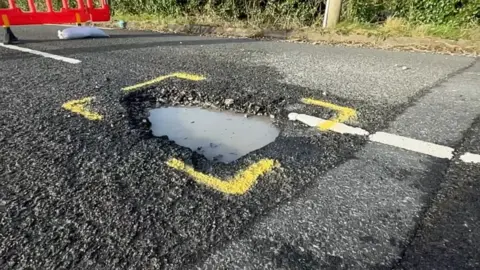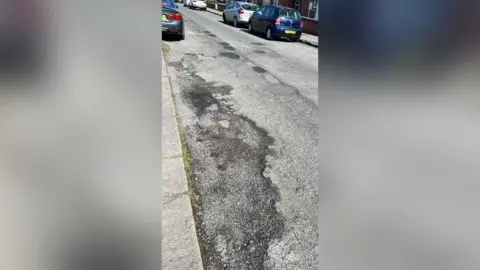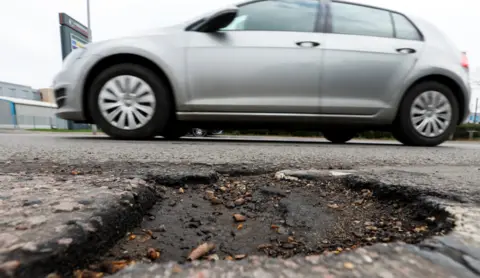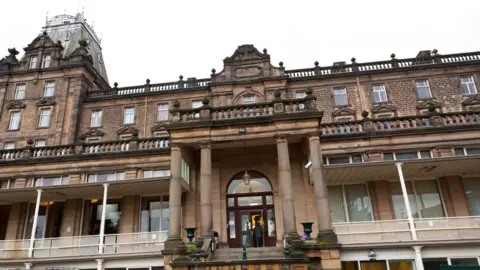Is Derbyshire the 'pothole capital' of England?
 BBC
BBCThe state of roads in Derbyshire has come under scrutiny during the local election campaign.
Candidates say angry drivers complaining about reoccurring potholes and a lack of long-term resurfacing are among the most common conversations on the doorstep.
The government recently unveiled more funding for the roads, but many candidates in the county feel the damage to Derbyshire's reputation has been done.
However, parties involved in the elections for Derbyshire County Council have outlined its plans to deal with the issue ahead of election day on 1 May.
A claim often made in the county is that Derbyshire is the "pothole capital of England".
This comes from national data given to the Liberal Democrats under a Freedom of Information request in 2023, so it is now out of date.
That data showed Derbyshire had more than 90,000 potholes – the most of any region by some way. Derbyshire County Council said the figure it provided was for the number potholes repaired.
It disputed the "worst in England" claim, saying it generally used different methodology to other councils.
More recent data from the Department for Transport acknowledges this, saying Derbyshire is difficult to compare to other authorities.
It is therefore difficult to conclude whether Derbyshire really is the "pothole capital".
The government will be able to give us a clearer picture of all this from next year though, when the methodology councils use will be standardised, making it easier to compare.

While we should be more cautious calling Derbyshire the "pothole capital", the council does still measure its performance - and its own figures suggest Derbyshire's roads have got worse.
Figures show when it comes to the percentage of local A-roads and motorways in need of repair, Derbyshire's have jumped from 12 in 2019 to 28 in 2024.
For B, C and unclassified roads, the figure more than triples, from 10 in 2019 to 38 in 2024.
The RAC also points to Department for Transport data, which shows Derbyshire County Council only preserved about 3% of major roads in 2023-24.
This means just under 13 miles, out of 390 miles, of major roads were given any form of preservation work - though no council performed particularly well in the data.
However, we are still waiting for the most recent data, due later this year, so it is difficult to say with certainty whether the roads have deteriorated more recently.
'Lot of concern'
Simon Williams, from the RAC, says while the data is caveated, it is "for the time being the best data we've got, and it indicates Derbyshire has the most roads in the 'red' condition".
This is the category the government uses for the mostly badly maintained roads.
"Councils obviously have a lot of financial pressure and challenges, there's probably more work [Derbyshire] would have liked to have done," he said.
"However, the government have now given record amounts to tackle the pothole problem and improve our roads.
"Research from the RAC this year named the poor state of roads as the number one issue for drivers - with 56% saying that.
"That's the biggest we've ever seen. So there is an awful lot of concern."
 Reuters
ReutersCounty council cabinet member for highways - and Derbyshire Conservative candidate Charlotte Cupit - says it is "not true" to call Derbyshire the "pothole capital", but she does acknowledge "there is a lot of work to do".
"We've had some shocking weather conditions, shocking floods... there's been a lot of damage caused. We need to get on top of that," she said.
"We need investment from government, but we also have been doing our bit locally.
"We've done a record resurfacing programme this last year, and this year we're going to do a record programme again.
"We want to invest in first-time fixes... a focus on resurfacing and resealing the roads so we can get there before the pothole appears."
Derbyshire Labour leader Joan Dixon rejects that it could be misleading to claim the county is the "pothole capital", because the roads are "getting steadily worse and worse".
"The main thing is that the experience of drivers in Derbyshire is really bad. I get people writing to me regularly saying I've had a puncture, I've damaged my suspension. I've never known it this bad," she said.
She added Labour would return to "basic maintenance" of the roads, rather than "reactive quick fixes".

In January last year, the council wrote an open letter to residents apologising for the "massive increase in potholes".
But Ed Fordham, leader of Derbyshire Liberal Democrats, says the state of the roads is "now beyond apology".
He said his party would focus on fixing potholes on the first attempt.
"There is no quality management, no assessment of contracts, no termination of poor workmanship," he said.
Derbyshire Reform UK candidate Stephen Reed says the party would find "efficiencies and savings" in the overall council budget to explore other options on road maintenance.
Gez Kinsella, the leader of the Derbyshire Greens, says that "too often pothole repairs are breaking down after six or nine months", and would explore introducing penalties for poorly executed maintenance, as well as advocate for better public transport locally.
Meanwhile Rob Marshall, from the Belper Independents, said "temporary patches aren't good enough", adding a 10 to 15-year plan to resurface the roads is needed.
You can search for who is standing for election in your local area on the BBC website.
Follow BBC Derby on Facebook, on X, or on Instagram. Send your story ideas to [email protected] or via WhatsApp on 0808 100 2210.
